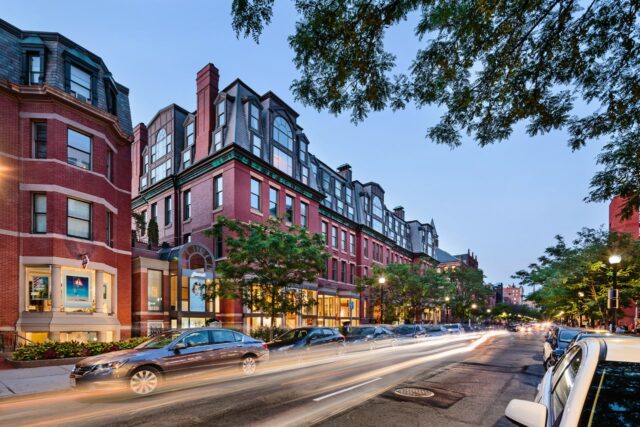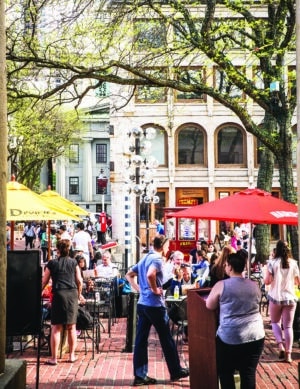The shutdown of huge swaths of the economy due to the coronavirus emergency is impacting every corner of the commercial real estate world in Greater Boston, particularly the retail sector.
And certain components within retail – including enclosed shopping malls, soon-to-open new developments and high-end retail districts like Boston’s Seaport and Newbury Street – could face particularly challenging times ahead in keeping or attracting tenants, industry executives say.
In many ways, the current coronavirus crisis, with its shutdowns of non-essential businesses across the state and nation, is acting as an “amplifier” and “accelerator” of previous trends within retail, with large brick-and-mortar department stores struggling for survival against online competitors, said Jeff Arsenault, a principal at Avison Young Global.
Arsenault and others point to published reports that J.C. Penney and Neiman Marcus, among other large retail mainstays of malls, are close to bankruptcy filings as the coronavirus mayhem burdens their troubled finances. Chains such as Wagamama, Primark, Sephora, Destination XL and DSW all recently announced layoffs of Massachusetts employees.
“For retailers not doing well before the coronavirus crisis, this is going to hasten their demise,” Arsenault said.
(sub)Mall Owners Feel the Heat
All this could put further pressure on some mall owners across the Greater Boston region, many of whom were reeling prior to the current COVID-19 and economic emergencies.
Ted Chryssicas, executive managing director of retail at Newmark Knight Frank in Boston, said many property owners were already experimenting with new types of retail tenants – from restaurants to fitness clubs to entertainment-related tenants – to help pick up the slack from the past loss of major retail tenants.
“There were a lot of new shops opening up, new players, not cookie-cutter chains,” he said. “Then, this came along.”
Besides this experimentation, some retail property owners had embarked on total retrofits and repositionings of retail properties.
Developer Edens Inc.’s makeover of the old Woburn Mall is adding up to 20 new storefronts, a theater complex and hundreds of apartments in a mixed-use project known as Woburn Village.
Edens executives could not be reached for comment. Real estate brokers privately say Edens may face challenges ahead, but they expect the well-respected company, which also owns Boston’s South Bay mixed-use development, to make Woburn Village work, precisely because it had previously committed to the more diversified “live, work, play” development concept.
In the long-term, other mixed-used projects with retail components should also fare well, if and when the economy reopens, largely because they have built-in clientele living in nearby residential units or working in office buildings, industry executives agree.
Luxury Concepts Look Vulnerable
Peter Montesanto, a principal at SRS Real Estate Partners in Waltham, said any retail property with “value-driven” tenants should also perform better than others, if only because the economy may not rebound fast and consumers may be hesitant about spending.
“People are going to be keeping a lot of their money under mattresses,” said Montesanto.
As a result, value retailers like Target, Walmart, TJX, Marshalls and BJ’s Wholesale should be able to weather the storm – and their landlords will be in better position to weather the storm as a result. Landlords with anchor grocery store and pharmacy tenants should also feel fortunate, industry players said.

High-end retailers, independently owned shops and national chains all are seeking a path to profitability in a struggle that has implications for Greater Boston commercial landlords.
But higher-end apparel stores, sit-down restaurants, jewelry stores and car dealerships may suffer once a reopening occurs – and their landlords may suffer along with them, Montesantso said.
“You may see a big fallout in this category,” said Montesanto.
Privately, some are closely watching how specific higher-end retail and restaurant districts perform in coming months, such as Boston’s Newbury Street and the booming Seaport District.
Though he declined to talk about specific entities and geographic areas, SRS’s Montesanto said he’s heard talk of some higher-end sit-down restaurants simply not re-opening if the shutdown lasts too long. Already one high-end steakhouse, Fleming’s in Back Bay, closed permanently thanks to the pandemic. And even if most restaurants do open soon, they’ll likely still have to operate with some social-distancing restrictions, such as limits on the number of patrons who can eat at establishments at one time.
And then there are questions about smaller retail-shop and restaurant operators in general.
“Larger stores have deeper pockets,” said Robert Sheehan, vice president of research at KeyPoint Partners. “But I think this is all going to hurt mom-and-pop [operations] the most, even more than national chains.”
Sheehan said the big question is whether the $2 trillion federal rescue plan approved by Congress will help many businesses, not to mention consumers, stay afloat.
‘So Many Unknowns’
Even if the economy partially reopens soon and even if retail operators snag some federal stimulus funds, there could still be social distancing restrictions applied to retail stores and restaurants, as well as hesitation by consumers to frequent establishments, he warned.
“There are just so many unknowns,” Sheehan said of the future of retail in general. “It’s so early in the game. There’s no basis for any opinion I can give you at this time. This is all a new thing.”
Peter Considine, a partner at the Dartmouth Co., says “everyone is reaching out to each other” – tenants, landlords and lenders – in an attempt to gauge what’s happening and what might happen moving forward.
Considine said it’s conceivable that rental prices may take a hit if many retail shops and restaurants close for good, expanding the supply of space available on the market at a time when demand is falling.
One positive for the retail sector: Greater Boston generally wasn’t oversupplied with new retail space before the coronavirus crisis hit, said Newmark’s Chryssicas. “There’s not a lot of new supply coming online,” he said.
And the lack of new supply could help in stabilizing prices moving forward, Chryssicas said.
Like others, Avison Young’s Arsenault said that all retailers are now in “unchartered territory” and that no one really knows where the retail sector is headed in coming months.
“Everyone is tapping the brakes,” he said. “Everyone is being cautious.”




 |
| 
